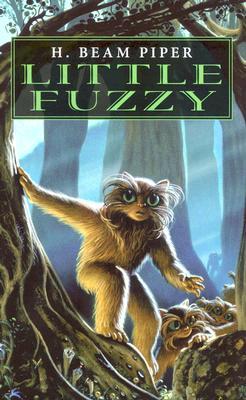Today I'm looking at an old sci-fi book, Little Fuzzy, which as you might remember was the inspiration for a remake by John Scalzi called Fuzzy Nation which I reviewed some time ago. Of course there are some significant differences between the two books, if for no other reason than because Little Fuzzy was written in 1962 so everyone's still using tape and film to record things. (Old sci-fi gets weird like that.) Overall the plots are mostly the same, the Zarathustra Corporation is interested in extracting as many resources as possible from a planet it owns lock, stock, and barrel for insane profits. However the discovery of a previously unknown species of indigenous creatures by prospector Jack Holloway raises some uncomfortable questions. If the local fuzzies are in fact an intelligent species it means the planet cannot continue to be strip-mined and has to be placed under government control for the fuzzies' protection, something the Zarathustra Corporation is willing to go to great lengths to prevent.
I want to begin by saying that I actually enjoyed both books, even if they have their own approaches. The inevitable comparison for a reader is between this, the original source material, and the remake by Scalzi. Is there one that's superior? I honestly don't know if I can say one way or the other because they each have their own charm. Little Fuzzy is definitely dated in its way, but I'm sure in fifty or so years Fuzzy Nation will also be considered fairly dated. I think both books have their own strengths and weaknesses and it's a great example of how someone can take an original idea and reinterpret in a new way.
Little Fuzzy is more a novella and much shorter than Fuzzy Nation but it ends up creating a bigger universe than Fuzzy Nation. I say that because there are far more characters in Little Fuzzy than in Fuzzy Nation, even though it's the shorter work and so there's a lot less for different characters to do through the book which moves along pretty briskly opposed to Nation's gradual build. And I'm not sure which one I actually prefer. A smaller cast of characters makes the story more efficient and keeps the story moving without having to add a bunch of extra people. However, a much larger cast makes the story feel like it's taking place in an actual community instead of some neck of the woods with the same five people. I do kind of wish with the larger cast there was more time to develop them as characters and I can understand Scalzi's decision to merge characters his own reinterpretation.
Another thing that seemed very different to me was how accepting people were that the fuzzies were sentient in Little Fuzzy opposed to Fuzzy Nation. Jack Holloway kind of concludes they're sentient pretty early on in the book and most people think they are, including local law enforcement and most of the scientists. It's really only the Zarathustra corporate bigwigs who are trying to prove they're not sentient, and even then they seem not entirely convinced themselves because they want to keep their charter. In the case of Fuzzy Nation it seems like more people are hesitant to believe the fuzzies are sentient so it creates more conflict for the characters and fuzzies to overcome. So I feel like Little Fuzzy is a lighter and softer version of the story.
A concern that I do have is how Little Fuzzy is pro-colonial in its outlook. Most of the characters are benevolent towards the fuzzies and see them as little people who need protection and support from the humans. The fuzzies happily adopt metal tools given to them by humans, as well as accept food and in one case accept tobacco. I'm aware that I'm overthinking this extensively but it looks very much to me like a native population being made dependent on resources from a colonizing power. And at the end of the book, Zarathustra is actually opened further for colonization by humans rather than being made the exclusive realm of the fuzzies. People also start making plans to adopt fuzzies who feel almost more like pets than actual sentient beings and equals. It just feels very pro-colonialism and it may just be an effect of this being written in the sixties before a strong critique of colonialism had developed.
Concerns aside, I did enjoy this book. I think it and Fuzzy Nation are fairly equal at the end of the day and I recommend everybody go and read both. They each have things they do well, and are almost complimentary rather than one replacing the other.
- Kalpar


No comments:
Post a Comment